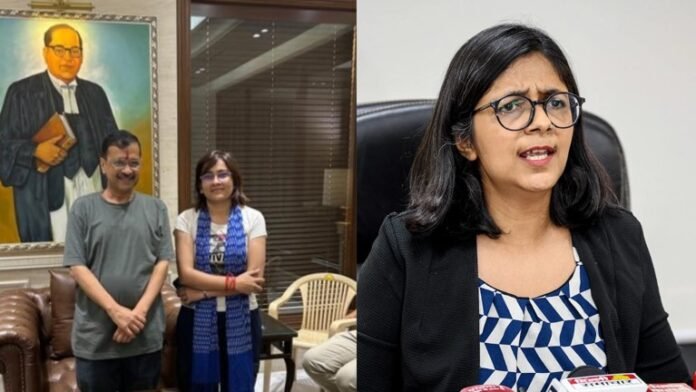A member of the Delhi Commission for Women (DCW) publicly criticized a Delhi minister for making comments about the clothing of Swati Maliwal, the chairperson of the DCW. The incident has sparked widespread debate about sexism and the treatment of women in public office.
The controversy began when a minister in the Delhi government reportedly made remarks about Maliwal’s attire during an official meeting. According to sources, the minister commented on the appropriateness of Maliwal’s clothing, suggesting it was not suitable for her role. The comments were allegedly made in a disparaging tone, which many have interpreted as an attempt to undermine Maliwal’s professionalism and authority.
Nisha Sharma, a prominent member of the DCW, was quick to condemn the minister’s remarks. In a strongly worded statement, Sharma accused the minister of perpetuating sexism and distracting from the important work being done by Maliwal and the DCW. “It is appalling that in this day and age, a woman’s attire is being used to judge her competence and commitment to her role,” Sharma said. “Such comments are not only disrespectful to Swati Maliwal but also to all women who are striving to make a difference in their fields.”
Sharma’s condemnation has received support from various quarters, including women’s rights activists, political leaders, and the general public. Many have taken to social media to express their outrage and solidarity with Maliwal. The hashtag #StandWithSwati began trending on Twitter shortly after the incident came to light, with users denouncing the minister’s comments and calling for a more respectful and inclusive political environment.
Maliwal, who has been a vocal advocate for women’s rights and has led several high-profile campaigns against sexual harassment and violence, responded to the controversy with a measured statement. “I have faced many challenges in my career, and I will not be deterred by comments about my appearance,” she said. “My focus remains on fighting for the rights of women and ensuring that their voices are heard.”
The Delhi government has not issued an official response to the allegations against the minister. However, sources within the administration suggest that there is growing pressure on the minister to apologize and retract the remarks. Some political analysts believe that the incident could have broader implications for the minister’s career and the internal dynamics of the Delhi government.
This incident has also reignited discussions about the treatment of women in politics and the pervasive sexism that many female leaders face. Despite significant progress in recent years, women in politics often find themselves subject to scrutiny and criticism that their male counterparts do not experience. This includes comments about their appearance, personal lives, and perceived emotionality, which can detract from their professional accomplishments and policy positions.
Women’s rights organizations have used this opportunity to call for more stringent measures to address sexism in political institutions. “We need comprehensive policies that protect women in politics from gender-based harassment and discrimination,” said Meera Khanna, director of a prominent NGO advocating for gender equality. “It is not enough to condemn these actions; we must create an environment where women are respected and valued for their contributions.”
The controversy surrounding Swati Maliwal’s attire highlights the ongoing challenges faced by women in leadership roles and the need for continued advocacy and reform. As public support for Maliwal and condemnation of the minister’s remarks grow, it remains to be seen how the Delhi government will address this issue and what steps will be taken to prevent similar incidents in the future.
In the meantime, Maliwal and her colleagues at the DCW continue their work undeterred, focusing on their mission to protect and empower women in Delhi. As Maliwal herself noted, “The real work is too important to be overshadowed by such distractions. We must remain focused on creating a safer, more equitable society for all women.”

